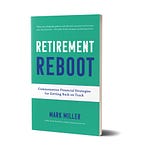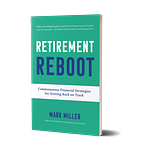
The podcast is a bit shorter than usual this week - on this special, brief edition, I’m rolling out my latest retirement guide. This one focuses on the issues surrounding the timing of retirement.
If you’re a subscriber to the newsletter, you know I’ve been publishing the guides on a regular basis. These are downloadable, quick reads paired with a podcast interview on the subject at hand. My aim is to create a series of just-in-time retirement education modules - read the guide, listen to the podcast and you’re good to go. The series already includes guides on claiming Social Security, transitioning to Medicare and how to hire a financial planner.
Becoming a subscriber is easy - to sign up, click the little green button at the bottom of the newsletter page, or visit my website to learn more. The subscription pricce is just $5 month, and you can cancel easily at any time if you’re not happy. Once you subscribe, you’ll have access to the entire retirement guide series, including this new one on retirement timing. Plus, you’ll get links to all the articles I publish for Reuters, The New York Times, Morningstar and Wealthmanagement.com. I also publish links to the most interesting new research in the field, and links to work by other journalists that I find compelling.
Finally, you’ll be supporting independent, unbiased journalism.
Why a guide on the timing of retirement decisions? Simply put, this can be a really important inflection point for your financial success in retirement, so it’s worth thinking about carefully.
The last years of work usually are peak earning years. And working even a few years more years - or less - will impact your retirement math significantly. Your timing affects the number of years that you’ll rely on savings to meet living expenses. It impacts the number of years that you can contribute to retirement saving accounts. And perhaps most important, working longer helps sets the stage for a delayed Social Security claim. That’s because it provides the income you need to meet living expenses while you wait to file.
But setting a retirement target date and sticking to it can be very difficult . . . even risky.
About one-third of workers tell pollsters they plan to work well past traditional retirement age, or not retire at all. But the data also tell us that about one-third of workers retire earlier than expected - and that the farther out you push your target date, the less likely you are to work to that date.
The most common causes for unexpected early retirement are health problems and job loss. But the study uncovered clear reasons for unplanned early retirement only in about one-quarter of cases.
Other reasons are more difficult to measure. The pull of leisure activities and time with family are factors, along with possible age discrimination. But the quality of work also matters.
In this podcast, I talk with several career experts on how to best navigate the job market and control your employment destiny.
Thanks for listening - and I hope to see you over on the subscriber side soon.
Is government tipping the scales in favor of Medicare Advantage?

Medicare Advantage is growing quickly — enrollment is expected to jump to 47 percent in 2029 from 34 percent this year, according to a Kaiser analysis of Congressional Budget Office projections.
Some of the growth stems from heavy investment by health insurance companies in geographic expansion and marketing via television and direct mail. Moreover, the industry points to high rates of consumer satisfaction with Advantage plans.
But the rise of Advantage also has been aided by changes in federal law and regulation over the past two decades that favor the program. And under the Trump administrations, critics say, Medicare’s administrators have been tipping the scales improperly in favor of Advantage.
Advantage’s growth has occurred without much debate in the public policy arena about the effects of such large-scale privatization on the long-range health outcomes for patients such as Mr. Stein, and on the costs to both government and enrollees.
This weekend in The New York Times, I examine whether government is tipping the scales improperly in favor of Medicare Advantage.
Other recommended reading this week
Strategies to mitigate the (partial) death of the stretch IRA . . . Steps women can take to improve their retirement outlook . . . A closer look at the Democratic Presidential candidates’ long-term care plans.










